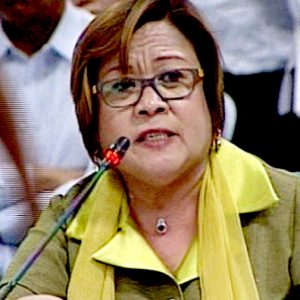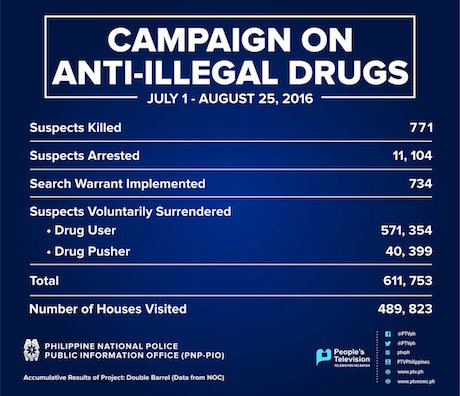Articles critical of Philippine President Rodrigo Duterte from foreign media outlets are coming out from left, right and centre lately. Unfortunately, they are mostly one-sided. One can’t help but think that they have an agenda — to damage the reputation of the new President and undermine his leadership. This is something that the members of the Liberal Party and their supporters would want.
Take the case of that TIME magazine article. The writer interviewed Senator Leila de Lima for comment about the government’s ongoing “drug war” without realising that the Senator is the last person to ask for a “fair” or “objective” assessment on Duterte’s policy. Aside from De Lima having an axe to grind against Duterte for her failure to pin him down back when she was still the Human Rights Chairperson on his alleged involvement in the Davao Death Squad when he was still Davao City Mayor, De Lima also is very defensive about her failure to eradicate the drug trade inside the country’s penitentiary – The New Bilibid Prison in Muntinlupa City when she was the Secretary of the Department of Justice.

Sen. Leila de Lima: The last person expected to make a fair assessment on the ‘war on drugs’
De Lima already lost her credibility to the public. The only people who support her are rabid Liberal Party supporters. Bringing up her sordid love affair with her former driver at the DOJ would only be considered wrong if the driver wasn’t linked to the drug lords operating at Bilibid prison. The driver would have had access to a lot of contacts inside because of his connection with then Secretary De Lima. Besides, as mentioned before, former President BS Aquino set a precedent for naming and shaming. It’s not surprising that Duterte is continuing the tradition. What’s surprising is how some people expect Duterte to play fair since he has always been brutally honest. De Lima, for her part, has a lot of explaining to do including her failure to deal with drug manufacturing inside the compounds of the Bilibid prison and how the drug epidemic in the country became worse under her watch.
Perhaps he didn’t have enough time to understand the complexities of Philippine politics because it seems Rishi Iyengar, the TIME article writer, was aiming to paint a very gloomy forecast for the next six years under the Duterte leadership. The writer obviously failed to question De Lima’s role as head of DOJ. He could have asked her what measures she instigated to clamp down on the drug lords operating with impunity inside Bilibid. He would have understood why Duterte blames her for the problems he has to deal with today. Pictures of her mingling with known drug lords at a party have been making the rounds on social media. The TIME article would have been more balanced had the writer mentioned it.
What is quite disturbing about the TIME article aside from getting mostly the side of those who are against Duterte’s policy on drugs is the notion that the Philippines’ drug problem is not that bad. Iyengar seems to think that Duterte exaggerated to scare the public so he can convince them that there is a need for drastic measures. He even called his move “the oldest autocratic trick in the book”. Comments like that serves as evidence that the writer applies a strong bias against Duterte in his writing.
In proving that Philippines’ drug problem isn’t that bad, he even compared crime rate figures from other places overseas against the crime rate in the Philippines:
But how bad is the Philippine drug problem? According to UNODC data, the highest ever recorded figure for the prevalence of amphetamine use (expressed as a percentage of the population aged 15 to 64) in the Philippines is 2.35. That is a high figure, but then the equivalent figure for the U.S. is 2.20, and the world’s real amphetamine crisis is among Australian males, where the prevalence is 2.90.When it comes to illicit opioid use, the Philippine prevalence rate is just 0.05, compared to 5.41 in the U.S., and 3.30 in Australia. For cocaine, the Philippine figure is only 0.03. In the U.K., it is 2.40, in Australia 2.10 and in the U.S. also 2.10.In other words, the statistics show what any visitor to the country may easily see: Filipinos are not degenerates, who need to be protected from themselves, but are mostly a nation of decent, sober, law-abiding and God-fearing people. The most revealing Philippine statistic is this: 37% of Filipinos attend church on a weekly basis. Less than 20% of Americans do.Nonetheless, Duterte has succeeded in convincing large numbers of his people that drug use constitutes such an emergency that the very existence of the nation is threatened, and that only his rule can save the Philippines. It’s the oldest autocratic trick in the book.
What the heck is the writer trying to say? That the Philippines can still wait a while before addressing the problem? It’s like saying that since the drug problem is not as bad as Mexico, Duterte’s tough stance on drugs is not justified. I don’t think the writer considered the fact that some crimes involving drugs do not get reported anymore and so the data showing the crime rate could be a conservative estimate. Besides, who is he to tell Filipinos when to deal with the country’s drug problem? Most people prefer to nip the problem in the bud. That is why Duterte has the support of the majority of the public. Indeed, foreign media should be focusing on the problems in other countries that are not addressing their own drug problems.
Speaking of other countries, in the U.S. the role of one of its own government agencies – the Central Intelligence Agency (CIA) – in importing cocaine into the country was exposed in the 1990s. They were alleged to have allowed the drug syndicates to sell cocaine to ghettos in California targeting the African-American community the purpose of which was to raise money for the Nicaraguan Contras rebel army. There was outrage when the stories were made public. Imagine your own government being a party to the proliferation of drugs. No wonder some people consider the U.S. war on drugs a “failure”. One government agency was fighting the drug trade while another was fuelling it. That’s just crazy. The investigative journalist who made a series of exposés on this was demonised and met a suspicious death that was ruled as “suicide”. His story was made into a film called Killing the Messenger.
Stories like that make one think that some members of the international community have lost any moral high ground to tell the Philippines how to mind its business. What happened in California in the 1990’s gives Filipinos enough reason to take most foreigners’ criticism with a grain of salt.
Foreign media writers need to put the issues they write about in the proper context. Not all those who were killed died in the hands of the Philippine police. If we are to follow the DOJ’s Operational Guidelines on what can be classified as “extra-judicial killings”, death of suspected drug lords and dealers aren’t even considered as such:
Extra-Legal Killings (ELK) or Extra-Judicial Killings (EJK) – For purposes of operationalization and implementation of A.O. No. 35, the ELK/ElK will refer to killings wherein:a. The victim was:i. a member of, or affiliated with an organization, to include political, environmental, agrarian, labor, or similar causes;or ii. an advocate of above-named causes;or iii. a media practitioneror iv. person(s) apparently mistaken or identified to be so.
Homicide where victims are allegedly drug dealers or drug lords cannot be considered “extrajudicial killings” under Philippine law.
For everyone’s information, here is an official tally of “deaths” in Duterte’s war on drugs as of today:

Yes, I know what you are thinking. It seems people have been reduced to numbers and one death is one too many. But this is the Philippines where most people were apathetic to victims of heinous crimes as a result of the drug epidemic in the last six years. It’s quite suspect the way some people are acting so “outraged” now especially since these same people routinely turned a blind eye to the BS Aquino government’s neglect.
No comments:
Post a Comment